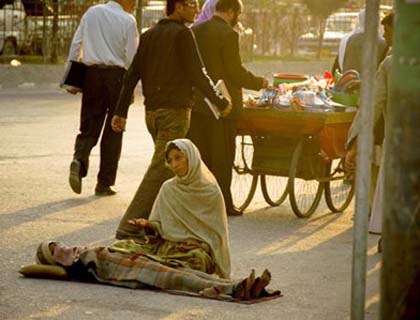“I can still feel the pinch of the cardboard on my feet as I walked three miles to school. But it was better than having leaking shoes. This was only one childhood experience that gave me the resolve to strive for a better life.”
I remember vividly when a number of children were walking to school for long hours in a mountainous village of Daikundi province. Their sloppy clothes and leaking shoes, in frigid weather, could raise one’s concern easily. Moreover, the teenage boys and girls were trembling with cold on the way to tuition classes in chilly winter. Some seemed to be faint with hunger and, perhaps, had got only a roof over their heads.
I could hardly repress my emotions to know that being a child in remote villages is unlucky. Although, the kids were romping jauntily in their childish games, their hearts must have been fraught with pain and suffering. In other words, their pale faces and wan smiles reflected the surreptitious world of their deprivation. Perhaps, whilst playing game or writing in the class, the children worried about dinner more than their parents. As a result, some of the kids curtailed their game to help their parents in household chores.
The twin problems of poverty and unemployment compound the challenges of the rural areas. They either have to grin and bear it in their sedentary life or must choose a nomadic life. Since the said problems are indigenous to their areas, people flock to neighboring countries so as to make the ends meet. So, the assiduous workmen leave their homes for many years in search of bread and butter. After all, they encounter manifold challenges in their peregrinations without receiving a cursory attention from the officials.
Lack of birth control multiplies their poverty. In spite of their economic constraints and nominal remuneration, many feel less sense of parental responsibilities regarding contraception and neglect paying a consummate attention to the needs of their children. It is believed that such issues precipitate violence or even social disorders.
Children naturally fantasize about utopian world in their childhood. Since a hungry person dreams a hot barbecue, the poor individuals also dream coins and visionary apartments. However, when their dreams do not come true, they will feel a lump in their throat. Therefore, some will resort to illegal activities so as to undo their deprivation – though it is a wrong selection. So, how to curb this challenge?
The government is supposed to facilitate the citizens and provide them equal rights and opportunities so that they can flourish their latent talents. Being born in a village must not be considered unlucky. In other words, a baby born in a remote area should be treated the same as one being born in the heart of a capital city. A high imbalance, in social, cultural, educational and economic issues among the citizens will put the government’s justice under question. Hope, the government no longer turns its back on the challenges of the rural areas.
Moreover, it is a great misfortune to see that the schism between the poor and the rich widens with each passing day. In the frigid zone of our inhumanity, one will not care about the empty stomach of his/her next-door neighbors. It is highly amazing for me that how the rich mollify their conscience to eat sumptuous meals in skyscrapers and don’t lose any sleep over their fellows’ poverty. To state incisively, the rumbling stomachs of the poor, who stay awake for the whole nights for feeling cold and hungry, cannot rouse their concerns at all.
It is rightly said, “... I was like a blindfolded man in a forest, who doesn’t even know where north or south is. If you don’t eventually come to truly understand the history of the class struggle, or at least have a clear idea that society is divided between the rich and the poor, and that some people subjugate and exploit other people, you’re lost in a forest, not knowing anything.”
I really feel nauseous with such types of life that we live. Moral values, which are the soul of a society, are taking their last breath and humans are short of humanity. No one feels the pains and pressures suffered by neighbors. So, how one can claim to cherish moral values?
“One of the reasons behind failure of the recent moral crusade is due to a lack of moral courage in identifying the root of corruption not just in Afghanistan but in the world. The root of corruption lies in the economic dictatorship of the world’s economies by a handful of financial interests who operate using banks and corporations. Those who profit out of this reign are corrupted by their blood money and those who are victims of this reign are corrupted by cultural imperialism and poverty. Hence, if we really want a moral society, we have to end economic exploitation of the economic dictatorship of Afghanistan and the world. This involves a movement for economic rights for every person to be guaranteed the rights to survival – such as food, water, clothing, shelter, education and medical care. This is a mission to create an economy of the local people, by the local people and for the local people.”
In addition, the rich should note that the blazing fire burning their neighbors emits smoke which will go to their eyes. To avoid going blind, they are recommended to go to their aid with a sense of humanity.

